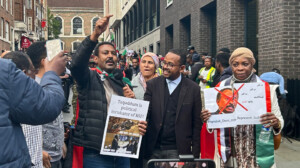Sudan’s Sovereign Council appointed
The Forces for Freedom and Change (FCC) have agreed on their five nominees for the Sudan’s Sovereign Council that will govern the country during the coming three-year transitional period. The FCC also agreed with the Transitional Military Council (TMC) on the 11th member of the Sovereign Council.
 Members of the Sovereign Council sworn in.
Members of the Sovereign Council sworn in.
The Forces for Freedom and Change (FCC) have agreed on their five nominees for Sudan’s Sovereign Council that will govern the country during the coming three-year transitional period. The FCC also agreed with the Transitional Military Council (TMC) on the 11th member of the Sovereign Council.
The five civilian nominees are Aisha Mousa of the National Gathering Initiative, Mohamed El Faki of the Unionist Rally, Siddig Tawir of the National Consensus Forces, Hasan Sheikh of Sudan Call, and Mohamed El Taayshi of the Sudanese Professionals Association.

Sources said that the junta and the FFC chose Rajaa Abdelmaseeh, a Coptic Christian woman, to be the 11th member of the Sovereign Council
The five military members of the Sovereign Council will be Abdelfattah El Burhan, Mohamed Hamdan ‘Hemeti’, Shamseldin Kabashi, Yasir Abdelrahman and Ibrahim Jabir.

African Union
African Union chairman Moussa Faki hailed in a statement on Monday the appointment of Abdallah Hamdouk as prime minister of the Sudanese transitional government. “This historic achievement is the culmination of months of negotiations and the result of the steadfast and peaceful resolve of the Sudanese people, especially the women and youth, for a democratic transition in Sudan,” said chairperson Faki.
Hamdouk is due to arrive in Khartoum today to take the Oath of Office. He will immediately assume duty as prime minister during the interim period.
Ministerial Advisory Councils
The University of Khartoum Lecturers Initiative organised a workshop on Monday and Tuesday on the Ministerial Advisory Councils and their role in supporting the transitional government. The workshop was aimed at Sudanese experts and candidates for ministerial positions.
A number of working papers were presented on the role of the Ministerial Advisory Councils, their composition and working mechanism, and how the transitional government can benefit from international institutions involved in fighting corruption. The health sector, technology and communication were discussed as well.
The Initiative said that the workshop aims to support the executive authority in the transitional period and to develop a vision about the advisory councils and their relationship with the Office of the Prime Minister and the ministries. Models were presented by which Sudanese and international expertise, both within Sudan and abroad, can contribute to these Ministerial Advisory Councils.
Our editorial independence means that we can continue to provide factual updates about political developments to Sudanese and international actors, educate people about how to avoid outbreaks of infectious diseases, and provide a window to the world for those in all corners of Sudan. Support Radio Dabanga for as little as €2.50, the equivalent of a cup of coffee.












 and then
and then